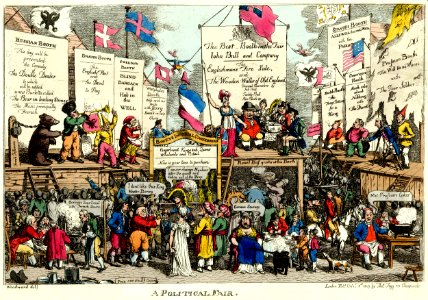A crowded fairground is used to show the international situation of 1807. Spectators and small attractions appear in the foreground, and larger booths on the platform. The signs are packed with allusions to english theater and to recent international events. For example, the "poor soldier" of the prussian booth refers to a comic opera by john o'keeffe and also to the reduced state of prussia after she lost significant territory in the treaty of tilsit. The sign in the danish booth refers to charles dibdin's opera "the english fleet in 1342. " napoleon is shown as the gingerbread baker, as in the famous caricature by james gillray. A dutch citizen tells napoleon he doesn't like that (gingerbread) king, but napoleon refuses to return it. This exchange refers to the fact that louis bonaparte was proclaimed king of holland in 1806. The american booth refers to the tension between england and the u. S. Over conscription of american citizens by the british navy, desertion of british sailors to american ships, and the crisis (the chesapeake affair) brought about by those practices. Reference source: george #10763. Subjects (lcsh): political cartoons; history--caricatures & cartoons; napoleon i, emperor of the french, 1769-1821; napoleonic wars, 1800-1815. Date: 1807. Place of creation: Cheapside, London. Medium: etching. Collection: University of Washington. A Political Fair (NAPOLEON 161)
Loading...
